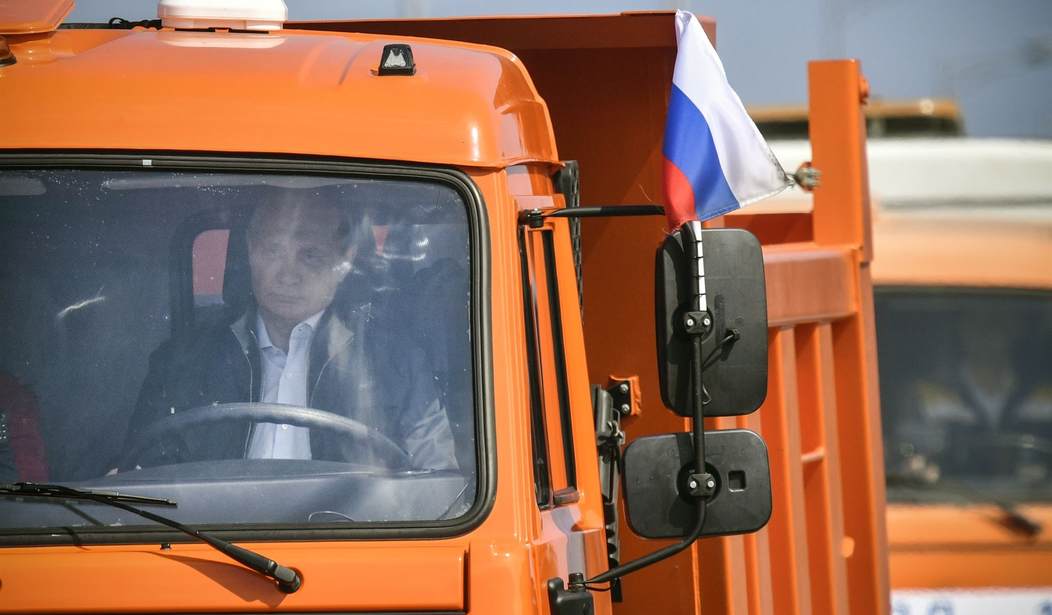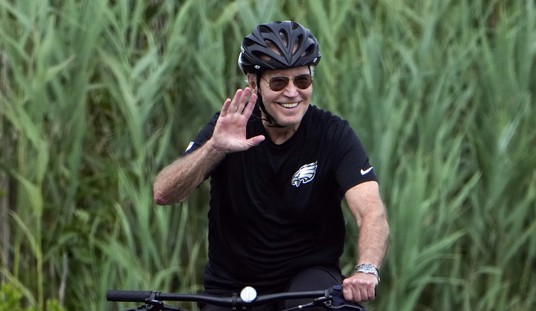Vladimir Putin appeared in person to open the 18-kilometer Kerch Bridge in 2018 as a symbol of the permanence of Russia’s annexation of Crimea. The front-page image of this post shows Putin in the driver’s seat of the first truck to cross from the Taman peninsula to Crimea. Russian TV covered it live at the time, helping to make the Kerch bridge a national symbol.
Four years later, a bombing rendered it all but inoperable, cutting off a main communications line to Crimea just as Ukrainian troops threaten to cut off Russia’s ground lines of communication via Kherson. Jazz has a good rundown on the whodunit aspects of this new development, but the strategic and political aspects are worth thinking through, too. The Guardian has footage of the explosion and the aftermath:
The Washington Post points out the strategic disaster this could be for Russian control of the area:
A giant explosion ripped across the Crimean Bridge, a strategic link between mainland Russia and Crimea, in what appeared to be a stunning blow early Saturday morning to a symbol of President Vladimir Putin’s ambitions to control Ukraine.
The damage to the bridge, which provided a road and rail connection between Russia and the Ukrainian peninsula the Kremlin illegally annexed in 2014, is another serious setback to Russia’s war effort in Ukraine, disrupting a crucial supply route.
Kremlin spokesman Dmitry Peskov acknowledged that the government had no timeline for repairing the 12-mile bridge.
Russia’s Investigative Committee, a top law enforcement body, said a truck explosion had ignited fuel tankers as a freight train crossed the bridge. The cause of the truck blast was not immediately clear. After the explosion, thick plumes of smoke and flames could be seen from a distance.
The bridge cost $4 billion to build and took an extraordinary amount of effort — and that was during a peaceful interlude between Putin’s 2014 seizure of Crimea and Donetsk and his 2022 all-out invasion. It projected Russian power as well as their declaration of permanence, but even at that time it also presented itself as a big, fat target.
Anton Troianovski wrote about another aspect of weakness the bridge highlighted as Putin opened the bridge in 2018. That turns out to have been prescient in ways even Troianovski didn’t outline:
The bridge opening represented a milestone in Putin’s efforts to show the world — and his people — that the annexation of Crimea was irreversible. The bridge will open to truck traffic in the fall, and a railroad component is scheduled to open late next year. It has been eagerly anticipated by Crimeans as an economic lifeline to their now-isolated and sanctions-hit territory. On Tuesday, state television predicted that it would bring many new tourists and lower food prices to Crimea.
It also underscored the Putin-centric system of political and economic patronage in Russia. Rotenberg’s role as the builder of the bridge showed how Russia’s billionaires have been able to leverage their closeness to Putin to further enrich themselves — while also rendering services to the state. …
The focus on Putin’s role, however, also hinted at a less flattering reality: the untold number of poor roads, railroads and bridges across the country that don’t benefit from the president’s personal patronage. The World Bank ranks the quality of Russia’s trade and transport infrastructure at 94th in the world, just behind Tunisia and ahead of Colombia.
Across the country, Russians complain of corruption and poor execution hindering much-needed public works repairs and infrastructure projects. The government’s push to pour money into Crimea will mean even fewer funds for projects elsewhere, said Dmitry Oreshkin, a Moscow political analyst.
The Kerch bridge was yet another way in which Putin doled out his political favors for those who supported his tsarist impulses. That same dynamic played out in the supposed “modernization” of Russia’s military. Putin et al have spent years building up the sophistication and capabilities of the Russian army, fueled by the supposed massive infrastructural investments from Putin’s oligarch cronies. Instead, what has become apparent is that the military has been starved of materiel, training, and talent while Putin’s pals have enriched themselves to obscene levels.
And all of that money, which could have gone into improving the lives of ordinary Russians as Troianovski pointed out in 2018, has not even given them a decent and capable system of national defense.
Russia announced that one side of the road bridge has reopened, but it may not be for long, as an explosion like that would likely have destabilized the foundation on both sides. Plus, what Russia really needs for supply into Crimea is the rail bridge. The Russian army relies heavily on rail for its supply and communication lines, and it’s no coincidence that the Kerch bridge system included rail from the beginning. The damage on that line looks like it could take weeks to clear even under the best conditions, let alone repair.
Repair, by the way, is no sure thing at this point. Putin will have to spend billions of dollars he doesn’t have in a wartime environment to fix what may end up being his last significant line of communication with Crimea. Where does that money come from, and where does he find the labor? How does Putin even get the materials? Now that the Kerch bridge has proven vulnerable, any money they do spend on repairing it might be wasted in another attack.
So who blew up the Kerch Bridge? Come on, man. It was still ambiguous this morning when Jazz wrote about it, but it fits too closely into Ukrainian war strategy to have much doubt. We certainly know who’s celebrating it:
Without directly claiming responsibility for the explosion Ukrainian officials have been posting gleeful messages to social media about the blast.
Mykhailo Podolyak, an adviser to Ukrainian President Volodymyr Zelenskyy, said it was just “the beginning” in a post on his Twitter account.
“Everything illegal must be destroyed, everything that is stolen must be returned to Ukraine, everything occupied by Russia must be expelled,” he wrote.
The Security Service of Ukraine meanwhile, said the bridge “beautifully burns,” in a Telegram post.
The military strategy seems pretty straightforward. Ukrainian forces are closing in on Kherson, where partisan battles have been ongoing lately as well. Kherson is the strategic land connection between Russia and Crimea, which Putin established in the early days of the invasion. (Establishing the land connection was a key strategic goal of Putin for the war, although hardly his only one.) Taking out the Kerch bridge — and especially its railway — would cut off Russian forces in Crimea almost entirely. “Just the beginning,” indeed.
That would either force Putin to begin sailing his ships into the area again to provide relief, where Ukrainian forces have proven adept at sinking Russian ships, or leave them cut off for an indefinite period while Russia tries to force its land communications open again in a new offensive. All of these are options that would strain even a von Clausewitz, but then again, a von Clausewitz wouldn’t have been caught in this kind of incompetent failure in the first place.
These Russian military leaders are of a different class entirely, as Putin is apparently discovering now. The Washington Post also reports today on the game of musical chairs being played in the Kremlin’s high command:
Far from bestowing glory on Russia’s military brass, the war in Ukraine is proving toxic for top commanders, with at least eight generals fired, reassigned or otherwise sidelined since the start of the invasion on Feb. 24. Western governments have said that at least 10 others were killed in battle, a remarkably high number that military analysts say is evidence of grievous strategic errors.
The upheaval in the upper ranks of uniformed officers highlights Russia’s fundamental mistakes in war planning, and the dysfunctional chain of command that resulted first in Moscow’s failure to achieve its primary military objective — the quick capture of Kyiv and toppling of the Ukrainian government — and more recently in the retreats on the eastern and southern fronts.
But the dismissals also reflect a scramble by political elites to place blame for the costly and faltering war as open criticism grows louder, particularly among pro-war hawks and propagandists.
Like their badly prepared forces on the front, the commanders in the Russian Armed Forces are turning out to be easy targets, even as senior political leaders, including Defense Minister Sergei Shoigu, the Chief of the General Staff Valery Gerasimov, and President Vladimir Putin himself had largely avoided direct criticism. Recent criticism of Shoigu, however, has signaled that his job, too, may finally be in jeopardy.
All of this churn at the top does nothing for morale at the bottom. The influx of untrained, unwilling conscripts to the front lines in Luhansk and Donetsk threatens to make things exponentially worse for front-line commanders. The best advice for Putin at this moment, before he loses even more than a bridge, his army, and his pride, comes from Field Marshal Gerd von Rundstedt. On July 1, 1944, when the Allied invasion of France had become too obvious a success to ignore, he angrily told chief of staff Wilhelm Keitel, “Make peace, you fools! What else can you do?”
The next day, of course, Hitler sacked von Rundstedt. That didn’t solve the problem for Nazi Germany, and it’s not solving the problem for Nazi Germany’s incompetent heir apparent in Moscow either.








Join the conversation as a VIP Member